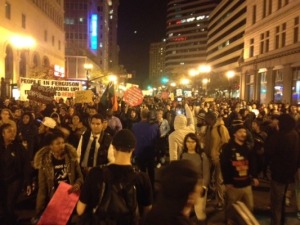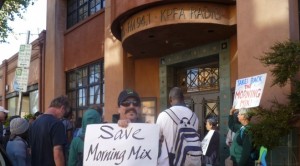By Ann Garrison, KPFA Unpaid Staff Council Member and Reporter/Producer
KPFA listeners seemed confused and disappointed when the station failed to preempt programming and broadcast live after the St. Louis District Attorney’s announcement that the Grand Jury would not indict Officer Darren Wilson for killing Michael Brown.
I tuned into KPFA myself, right after watching the St. Louis District Attorney’s press conference on C-Span, and was surprised to hear the regularly scheduled programming, Africa Today, with Walter Turner without any Ferguson coverage. I went back to switching between MSNBC’s outrage and Fox News’s celebration.
It later occurred to me that if Walter Turner’s show had been live, Walter would have been commenting on what had just happened, so the show must have been pre-recorded. I also thought that, though I can’t claim to know Walter well, he most certainly would have understood if his pre-recorded show had been preempted for live broadcasting.
I didn’t otherwise have a strong opinion about what KPFA should have been doing right after the press conference. I just knew I wasn’t interested in what it was doing. Women’s Magazine host Kate Raphael remarked later that she and a friend had been driving around, trying to figure out where a protest would be forming, and they were surprised when they weren’t able to tune into KPFA and find out.
That sounded right. News of where protestors were gathering seems to be the minimum KPFA listeners should be able to expect. Reporters or simply callers dialing in from the protests would have added value, and a video livestream like that arranged during the Block the Boat demonstrations would have been even better.
Former KPFA GM and WBAI PD Andrew Leslie Phillips nailed it, though, when he wrote, on a social media site, that “KPFA should have preempted and opened the phones. It’s a no brainer. It’s what radio does best.”
Of course. People were emotional and/or in shock, even though very few had expected an indictment. They would want to call in and hear others calling in and feel like KPFA was a community. I myself turned to Facebook and Twitter for a sense of community, as I switched TV channels between MSNBC and Fox talking heads and livestreams from Ferguson, but I felt like something was missing: KPFA. I would have liked to hear the phones thrown open and that would have been enough to assure that the location of protests gathering around the Bay would have been called in.
Andrew also wrote that, “Management are often intimidated by staff – but when program managers make intelligent, news-generated decisions, staff understand. It’s not about staff or unions, it’s about serving listeners. Preempting programs invigorates the air. It’s almost always good radio. And Pacifica should be out in front on this.”
He’s absolutely right. Never mind that he’s on the Save KPFA side, I’m on the UCR side, or whatever else. Who cares? He nailed it. “KPFA should have preempted and opened the phones . . . it’s a no-brainer. It’s what radio does best.” I’ve always respected Andrew’s radio artistry and most always respected his programming judgment.
I don’t know why KPFA barely responded during the first days after the St. Louis Grand Jury decision and don’t care. I just hope something that feels like community radio comes together next time, as it did after George Zimmerman’s acquittal, and during the Block the Boat for Gaza demonstrations at the Port of Oakland. KPFA should feel proud to have played a role in the Block the Boat for Gaza organizing success that was reported by news outlets around the world, including Israel’s.





